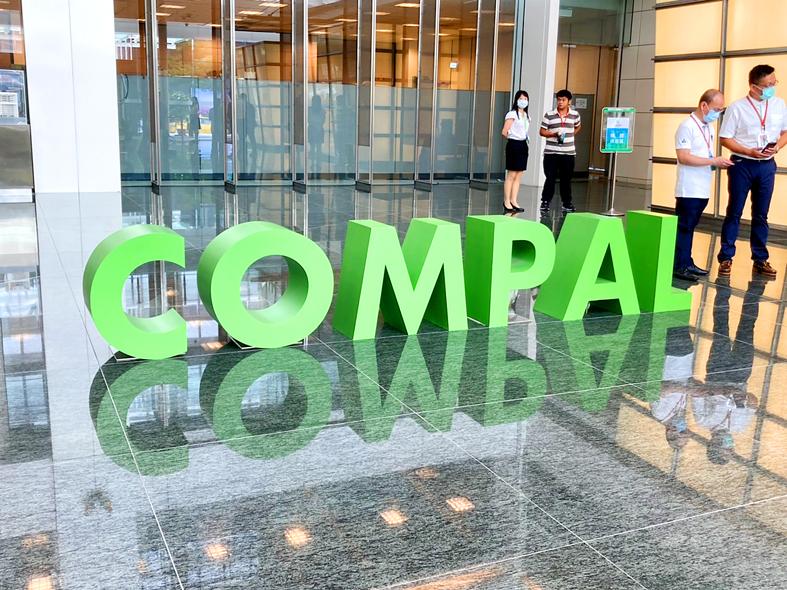Compal Electronics Inc (仁寶電腦), the world’s No. 2 contract notebook computer maker, yesterday forecast robust shipments for the year due to solid demand from enterprises and PC gamers.
By contrast, global PC shipments this year are likely to be flat or edge lower, as Russia’s invasion of Ukraine is weighing on already weakening demand for notebook computers, mainly Chromebooks, because energy hikes are stoking inflation and hampering a recovery in Europe, the company said.
“As Europe depends heavily on energy imports from Russia, the war and financial sanctions against Russia are boosting energy prices in Europe and having an impact on the economy there,” Compal president Martin Wong (翁宗斌) told a teleconference.

Photo: Chen Rou-chen, Taipei Times
“If the situation continues, PC demand will be affected. Consumers are going to delay spending on non-essential items once the economy worsens,” he said.
Compal has a different outlook, given its greater exposure to markets seeking commercial notebook computers and gaming models, Wong said.
Commercial models accounted for more than 40 percent of the Compal’s 54 million units last year, the company said.
“We expect shipments to continue to increase this year, because of our product portfolio,” Wong said.
Compal’s notebook computer shipments last year increased 20 percent from 2020.
The latest lockdowns in China are to have only a limited impact on the company’s shipments, because its manufacturing sites are not all in the same location, Wong said.
The company operates four major manufacturing sites in China: in Jiangsu Province’s Kunshan and Nanjing, and in Sichuan Province’s Chengdu and Chongqing, he said.
The company also makes notebook computers in Vietnam, which contributes up to 20 percent of its total manufacturing capacity, he added.
“With sites in different locations, it is easier for us to allocate capacity to support each other,” Wong said.
However, with continued shortages of key components, the company’s notebook shipments this quarter are expected to plunge 20 percent quarter-on-quarter, before showing a double-digit percentage increase next quarter, he said.
Compal reported that net profit last year soared 35 percent to NT$12.63 billion (US$441.42 million) — the highest in 11 years — from NT$9.36 billion in 2020, or earnings per share of NT$2.9 from NT$2.16.
Company revenue last year increased 18 percent to NT$1.24 trillion from NT$1.05 trillion in 2020.
Compal said that its board of directors yesterday approved the distribution of a cash dividend of NT$2 per share, including NT$1.6 per share from last year’s earnings and NT$0.4 from a profit surplus.

Quanta Computer Inc (廣達) chairman Barry Lam (林百里) is expected to share his views about the artificial intelligence (AI) industry’s prospects during his speech at the company’s 37th anniversary ceremony, as AI servers have become a new growth engine for the equipment manufacturing service provider. Lam’s speech is much anticipated, as Quanta has risen as one of the world’s major AI server suppliers. The company reported a 30 percent year-on-year growth in consolidated revenue to NT$1.41 trillion (US$43.35 billion) last year, thanks to fast-growing demand for servers, especially those with AI capabilities. The company told investors in November last year that

Intel Corp has named Tasha Chuang (莊蓓瑜) to lead Intel Taiwan in a bid to reinforce relations between the company and its Taiwanese partners. The appointment of Chuang as general manager for Intel Taiwan takes effect on Thursday, the firm said in a statement yesterday. Chuang is to lead her team in Taiwan to pursue product development and sales growth in an effort to reinforce the company’s ties with its partners and clients, Intel said. Chuang was previously in charge of managing Intel’s ties with leading Taiwanese PC brand Asustek Computer Inc (華碩), which included helping Asustek strengthen its global businesses, the company

Taiwanese suppliers to Taiwan Semiconductor Manufacturing Co. (TSMC, 台積電) are expected to follow the contract chipmaker’s step to invest in the US, but their relocation may be seven to eight years away, Minister of Economic Affairs J.W. Kuo (郭智輝) said yesterday. When asked by opposition Chinese Nationalist Party (KMT) Legislator Niu Hsu-ting (牛煦庭) in the legislature about growing concerns that TSMC’s huge investments in the US will prompt its suppliers to follow suit, Kuo said based on the chipmaker’s current limited production volume, it is unlikely to lead its supply chain to go there for now. “Unless TSMC completes its planned six

Power supply and electronic components maker Delta Electronics Inc (台達電) yesterday said it plans to ship its new 1 megawatt charging systems for electric trucks and buses in the first half of next year at the earliest. The new charging piles, which deliver up to 1 megawatt of charging power, are designed for heavy-duty electric vehicles, and support a maximum current of 1,500 amperes and output of 1,250 volts, Delta said in a news release. “If everything goes smoothly, we could begin shipping those new charging systems as early as in the first half of next year,” a company official said. The new